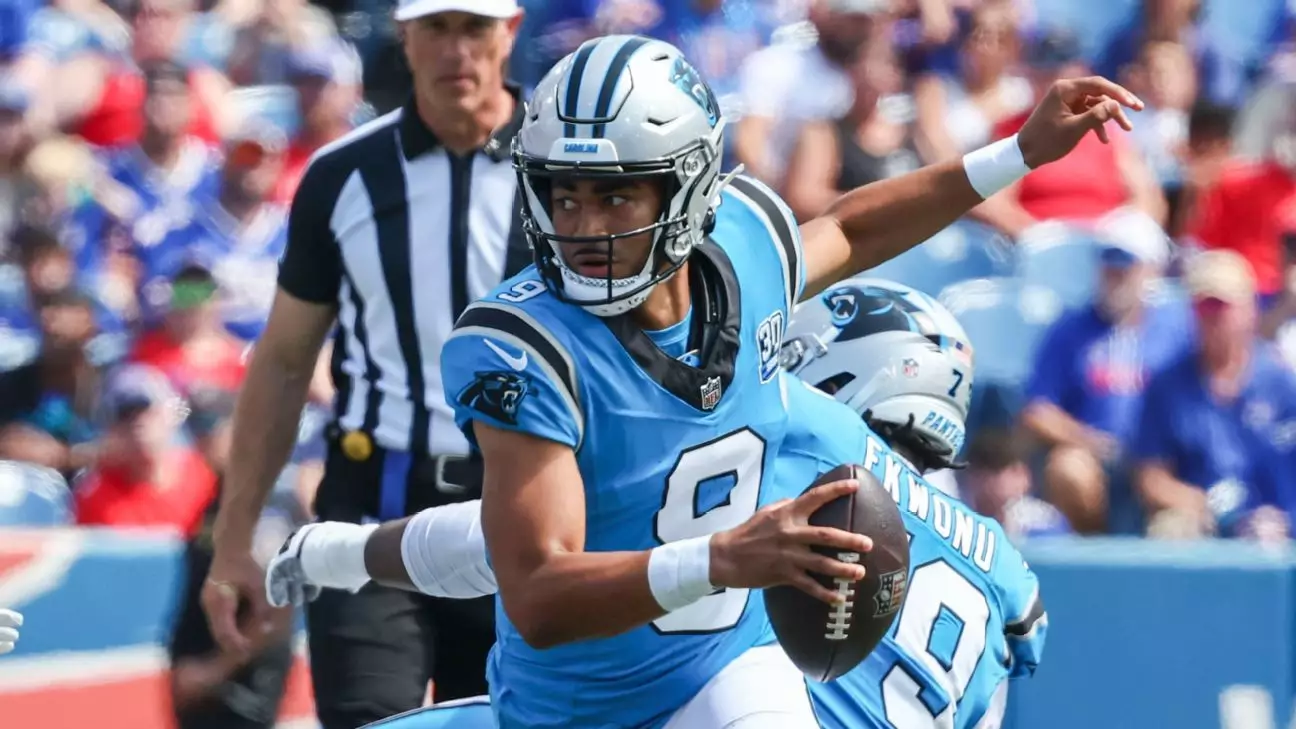In the world of professional football, particularly in the highly competitive realm of the NFL, the trajectory of young quarterbacks is constantly scrutinized. Following an inauspicious beginning to his career with the Carolina Panthers, Bryce Young has faced considerable criticism and questions about his potential as a franchise quarterback. However, head coach Dave Canales has publicly expressed unwavering support for Young, emphasizing that this journey is far from over.
Young’s benching after the Panthers’ 0-2 start, coupled with a dismal 2-16 record over 18 games, has raised eyebrows across the league. His replacement by seasoned veteran Andy Dalton showcases the urgency with which the Panthers are approaching the current season. This move, while pragmatic, inevitably puts Young in a difficult position—they risk stunting his growth as a player while attempting to salvage the team’s immediate performance. Canales’s assertion that trading Young is “not something we’re really considering” reinforces a belief in the quarterback’s long-term potential, despite the pressing need for results.
The context surrounding Young’s performance cannot be ignored. With three interceptions and no touchdowns in just two games, his Total QBR stands at an alarming average of 9.1. Such statistics are historically concerning for any quarterback, particularly one selected at the top of the draft. Moreover, Young’s physical stature, frequently debated before the draft, has not shown to be an impediment to his skill set, according to his teammates. Veteran wide receiver Adam Thielen pointedly stated, “That’s been zero factor,” pushing back against the narrative that Young’s height is a barrier to his success.
The confidence exhibited by Young’s teammates raises pertinent questions about the dynamics within the Panthers’ locker room. Running back Miles Sanders and Thielen both articulated their belief in Young, praising his work ethic and football IQ. Comments like Sanders’s emphasis on Young’s dedication—being “the first one in the building, the last one out”—speak volumes about the culture within the organization. Support from established players is crucial in helping a young quarterback navigate tough times, as it fosters trust and belief.
Moreover, operating within an environment where players voice their unwavering confidence in Young could be pivotal for his mental resilience. Young is aware of the challenges he faces, and though sources suggest he is unhappy about being benched, maintaining professionalism is essential for his future aspirations.
Coach Canales’s forward-thinking approach highlights the more extensive developmental philosophy the Panthers seem to advocate. His statement that “the development didn’t stop” implies a commitment to nurturing Young’s talent rather than solely focusing on immediate wins. This developmental mindset is critical, particularly for a quarterback in his position, who needs the right coaching and experience to flourish.
While the decision to bench Young could be perceived as a detriment to his confidence, Canales appears to place the team’s collective goals above individual performances. This approach aligns with a broader narrative in sports: that a cohesive team effort often overshadows singular endeavors when it comes to achieving success. Young’s participation in scout team activities indicates a continued involvement in game planning, albeit from a different vantage point, and suggests an ongoing investment in his development.
As the Panthers prepare to face the Las Vegas Raiders, all eyes will be on Dalton’s performance as well as Young’s response during practice sessions. The organization’s commitment to Young as a developmental quarterback reflects a vision that extends beyond the present moment. This patience may ultimately yield rewards, should Young learn from this experience and come out stronger on the other side.
Young’s early struggles, while significant, do not define his career trajectory. Notably, historical precedents exist for quarterbacks who have weathered similar storms only to achieve greatness. Troy Aikman, despite an atrocious start to his career, emerged as a Hall of Famer and Super Bowl champion. Such narratives provide the hope that Young can rewrite his story—one throw and one game at a time.
For Bryce Young, the path ahead may be fraught with challenges, but backed by a supportive coaching staff and teammates, his potential remains intact. The Panthers must balance the urgent quest for wins with the longer view of developing a franchise quarterback—an endeavor that, with time, could lead to future success.


Leave a Reply